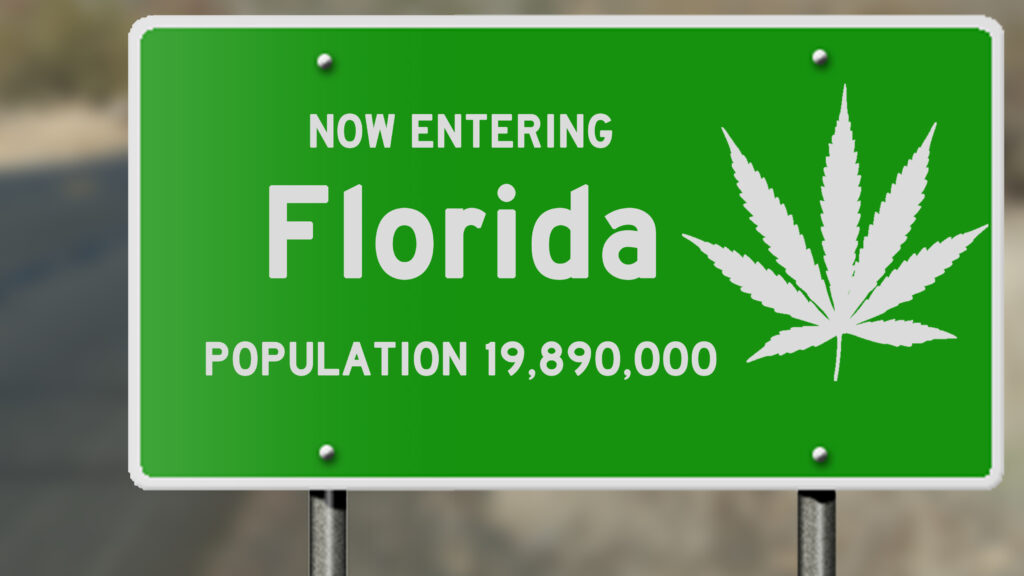
A Florida House panel has approved legislation to preemptively set potency caps on recreational marijuana ahead of a potential vote on a legalization initiative on the November ballot.
The legislation, which would prohibit dispensary sales of adult-use cannabis flower with a potency of greater than 30 percent THC, cleared the House Health and Human Services Committee on a 14-6 vote on Thursday.
All other cannabis products would be limited to 60 percent THC under the legislation, and it would mandate a serving size on edible products of 10 milligrams THC or less, with the total amount per package no more than 200 mg.
A New Poll Finds That Floridians Want Legal Marijuana
Before voting on the bill, the committee adopted an amendment to limit cannabis vape cartridges to a size of one gram. The amendment also removes a sunset provision in current law that would repeal the current medical cannabis program law six months after a marijuana constitutional amendment, such as the one that may be on the November ballot, is adopted.
Rep. Ralph Massullo (R), the bill’s sponsor, told colleagues that “we’re only at the beginning of understanding the potential long-term benefits and harms of using high potency THC marijuana.”
“It’s important for us as elected representatives to protect the public from potential harms, including harms that might occur through adult-use marijuana,” he said.
Massullo’s legislation as introduced would have initially set a potency limit of 10 percent THC for flower cannabis, but that was raised to 30 percent during a subcommittee hearing earlier this month.
Similar marijuana potency restriction legislation is also advancing in the Senate.
Florida’s medical cannabis dosage limits, meanwhile,—which were revised under controversial rules adopted in 2022, despite pushback from then-Agriculture Commissioner Nikki Fried (D)—are not based on the percentage of THC in a given product.
While the legalization measure itself has not yet officially qualified for Florida’s November ballot, Gov. Ron DeSantis (R) recently predicted a favorable legal outcome for activists in the Supreme Court in the face of a challenge from the attorney general who is seeking to block the vote.
“I think the court is going to approve that,” the governor said at his final presidential campaign event in New Hampshire last month, “so it’ll be on the ballot.”
Florida Attorney General Ashley Moody (R) has asked the court to invalidate the measure, despite activists collecting nearly one million signatures for ballot placement. The state official previously successfully petitioned justices to prevent a 2022 legalization initiative from receiving voter consideration.
That won’t be the case this round, according to the governor. While he opposes the reform—and pledged not to federally decriminalize marijuana if elected president when he was running—he says voters will get a chance to decide on the issue this time.
The state Supreme Court heard oral arguments in the case against the Smart and Safe Florida campaign last November, but it has not issued a ruling yet. It will need to do so by April 1.
DeSantis also weighed in on another relevant cannabis policy issue recently when he said that he doesn’t believe the federal gun ban for state-legal marijuana consumers is constitutional. Florida’s former agriculture commissioner brought a lawsuit against the Biden administration over the rule, though the governor did not get involved.
The Florida Chamber of Commerce released a poll recently showing that the reform proposal enjoys majority support from likely voters—but not quite enough to meet the state’s steep 60 percent threshold for passage.
That said, other previous polls have found that voters are well positioned to pass the legalization initiative with more than enough support. For example, the University of North Florida put out a survey that showed 67 percent of voters back the proposal.
The multi-state marijuana company Trulieve has contributed more than $40 million to the Smart and Safe Florida campaign to date. The state attorney general has accused the company of supporting the measure in order to have a “monopolistic stranglehold” on the state’s cannabis market.
Meanwhile, legislation to restrict consumable hemp products is also advancing in the Florida legislature.
Separately, a House subcommittee recently advanced a medical marijuana bill that would waive patient registration and renewal fees for service-disabled military veterans.


